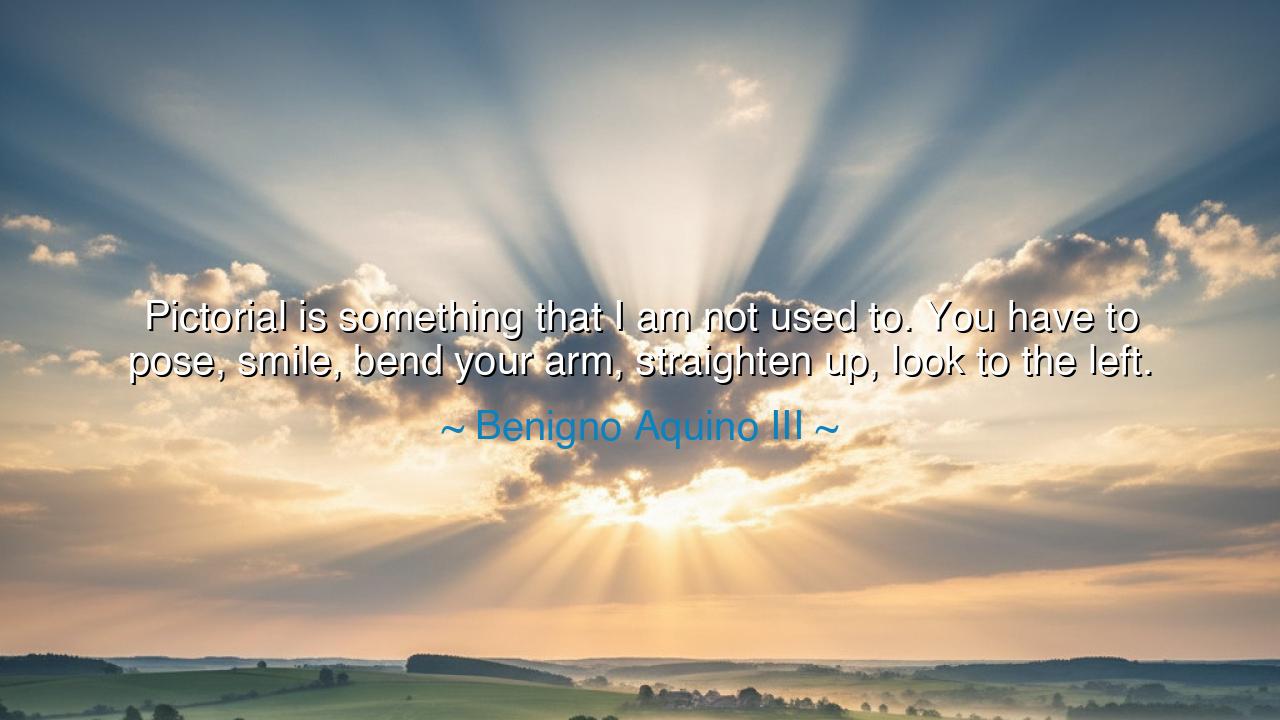
Pictorial is something that I am not used to. You have to pose
Pictorial is something that I am not used to. You have to pose, smile, bend your arm, straighten up, look to the left.






Hear now the words of Benigno Aquino III, a leader who carried the burdens of state yet spoke humbly of the simplest human task: “Pictorial is something that I am not used to. You have to pose, smile, bend your arm, straighten up, look to the left.” Though his words may seem light, almost playful, they conceal a deeper wisdom. For they reveal the tension between the natural self and the demands of image, between authenticity and performance, between who we are and how the world expects us to appear.
The meaning of this truth begins with the pose. To stand before the camera is to stand before the gaze of others, not as oneself alone, but as a figure shaped by expectation. The smile, the posture, the angle of the head—all are not chosen for comfort but arranged for perception. Aquino confesses his discomfort with this ritual, for it is not his nature to bend and turn for appearance’s sake. In this, he reveals the eternal struggle of leaders, artists, and all who walk in public life: to balance the truth of their being with the mask demanded by the world.
This conflict has ancient roots. Recall Marcus Aurelius, emperor of Rome, who wrote in his Meditations that he cared little for the applause of the crowd, for their praise was fickle and their judgments shallow. Yet even he was forced to stand before them, to embody the role of emperor, to wear the dignity and posture of power. Like Aquino, he may have found the smile and the pose foreign, but he understood that the image of leadership carries its own weight. Thus, even the most reluctant must sometimes yield to the stage of appearances.
There is also humility in Aquino’s words. He does not boast of mastery over the rituals of image-making; rather, he admits his unease. This admission itself is rare, for many cloak their awkwardness in pride or pretense. By speaking honestly, he reminds us that even those in high places remain human, unaccustomed to the endless demands of presentation. His words strip away the illusion that leaders are natural performers, showing instead that authenticity often struggles against the weight of outward performance.
Yet there is wisdom in recognizing this discomfort. For if a leader or any person grows too accustomed to the pose, too comfortable with the smile crafted only for others, they risk losing themselves. The mask becomes the face, and authenticity is forgotten. By admitting his lack of ease, Aquino safeguards the truth of his own nature—he is not at home in pretense, but in sincerity. This is a lesson for all: that while the world may demand appearances, we must never forget the core of who we are beneath them.
The lesson for us is clear: there will be times when life asks us to pose—to smile when we do not feel joy, to stand tall when we feel small, to project confidence when we are uncertain. Such moments are part of living in community, part of serving others, part of leadership itself. But we must not let the pose replace the person. Authenticity must remain our anchor, lest we be swept away by performance and forget the truth of our own hearts.
Therefore, let each one act thus: fulfill the rituals of appearance when duty requires, but return always to authenticity. Do not despise the discomfort of the pose, for it reveals that you still value sincerity. And above all, remember the self behind the smile, for that is the self the world needs most.
Thus, the teaching is eternal: To bend the arm, to straighten the back, to turn the face left or right—these are but fleeting gestures for the eyes of others. But to remain true within, even while the world demands its pictures, is the mark of wisdom. For the smile posed may fade, but authenticity endures forever.






AAdministratorAdministrator
Welcome, honored guests. Please leave a comment, we will respond soon